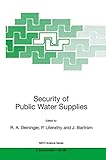Security of public water supplies Libro electrónico editors: R. A. Deininger, P. Literathy, J. Bartram
Tipo de material: Libro
en línea Idioma: Inglés Detalles de publicación: Dordrecht Springer science c2000Descripción: viii, 251 páginas diagrs., gráf., mapas centímetrosISBN:
Libro
en línea Idioma: Inglés Detalles de publicación: Dordrecht Springer science c2000Descripción: viii, 251 páginas diagrs., gráf., mapas centímetrosISBN: - 0792361229
- 9780792361220
- 9789401142410 (Online)
- Disponible en línea
Incluye bibliografía e índice
Disponible para usuarios de ECOSUR con su clave de acceso
"The best of all things is water" -Pindar 460 B. C. The provision of secure drinking water for its citizens is an aim of every government, and is a priority item to all the NATO and CP countries. The quantity of water in most of these countries is usually adequate, but the quality in many cases is not. With the development of new analytical methods, one suddenly finds new substances of human origin in drinking water. Also, new microorganisms and their toxins pass through the conventional treatment plants to show up in the finished water. What aU of this means to public health is not quite clear at the moment, but it seems that increased vigilance is necessary to provide safe drinking water to all citizens. The NATO Advanced Research Workshop was organized to focus on five major areas of concern: Inorganic contaminants, focusing on arsenic and copper Organic contaminants, focusing on petroleum products, and insecticides and pesticides Biological/bacteriological problems in raw water, finished water, and in the distribution system River water watch and surveillance systems The role of research, the economics of privatization, the support of international organizations This volume presents the papers that were delivered at the workshop over a period of four and one-half days. The workshop was attended by over 40 scientists, government officials, and academics from 20 NATO and CP countries." Inglés
Disponible en línea
Disponible en formato PDF


